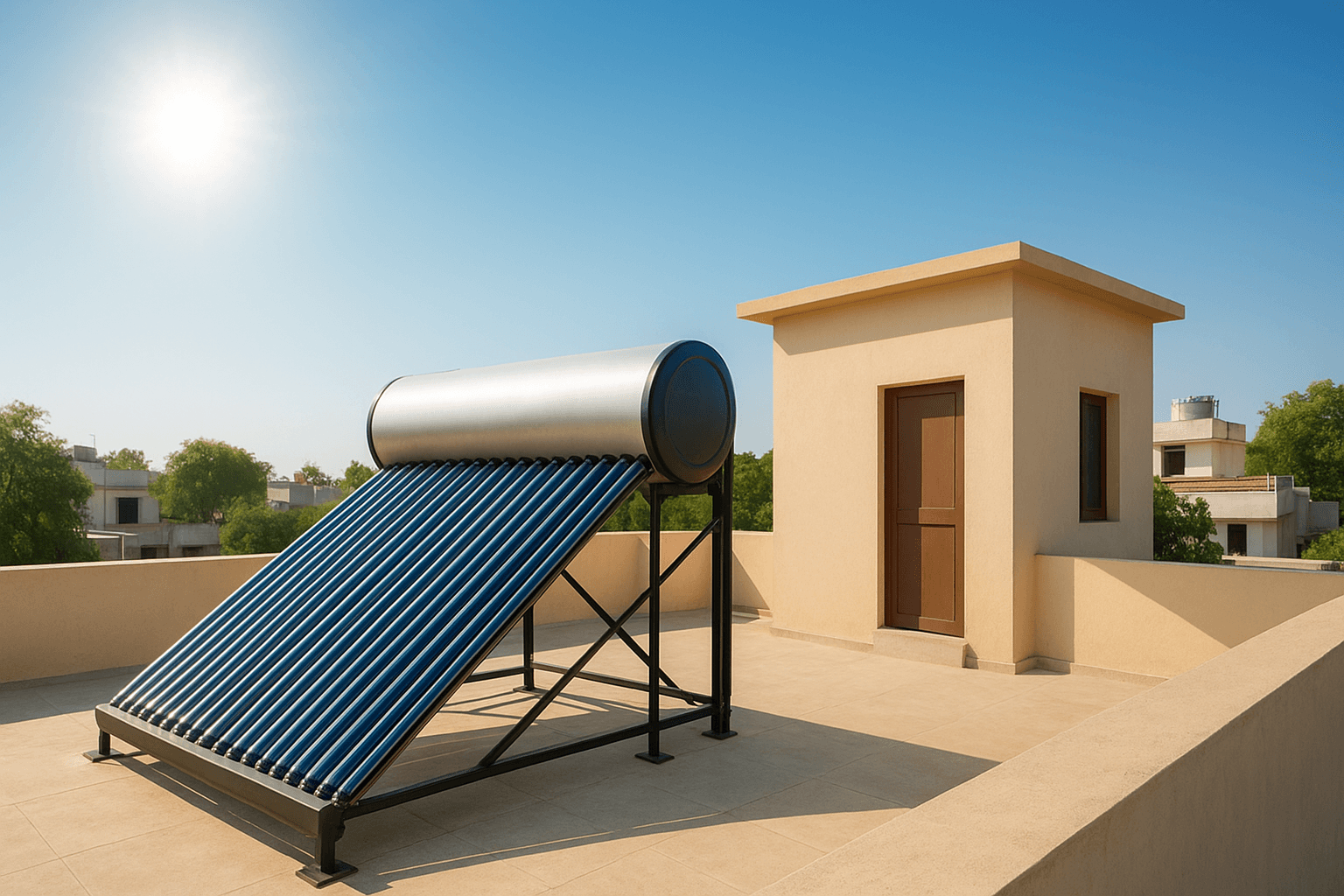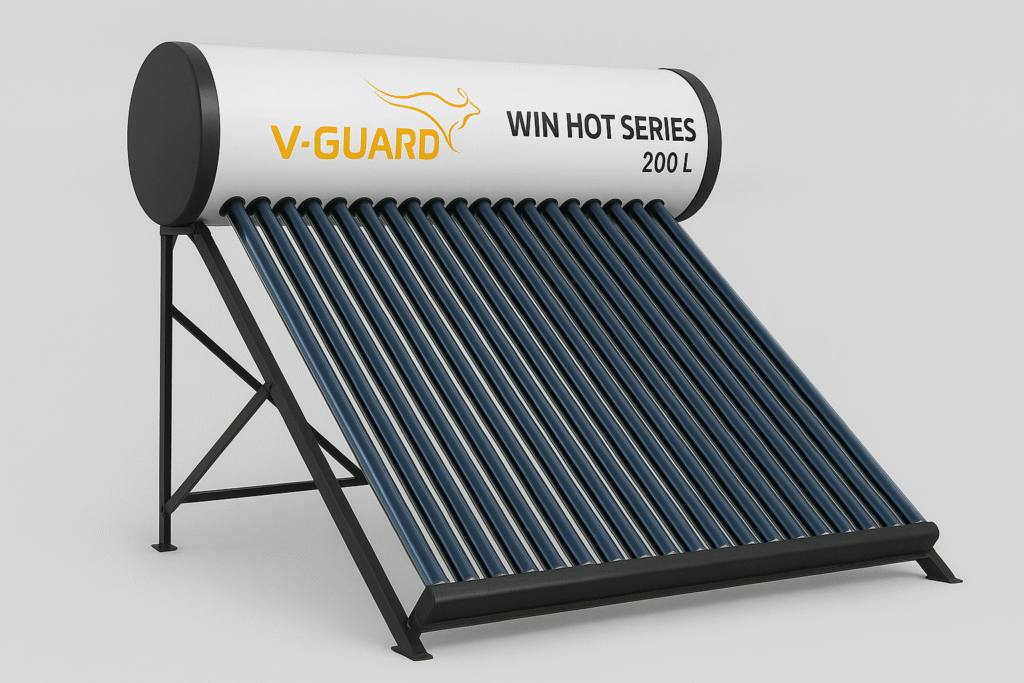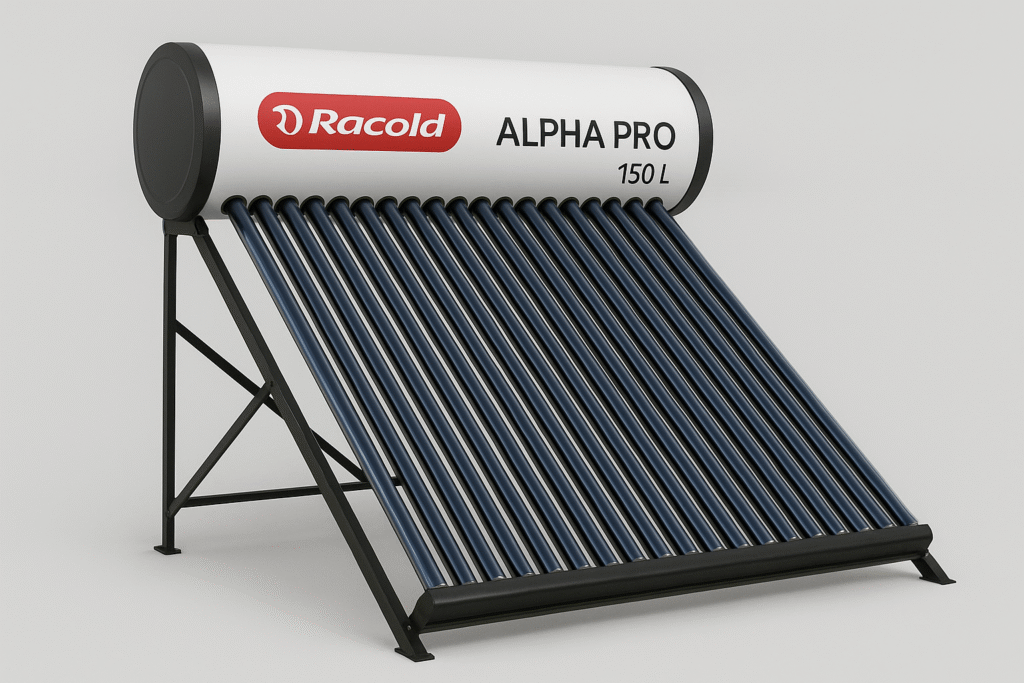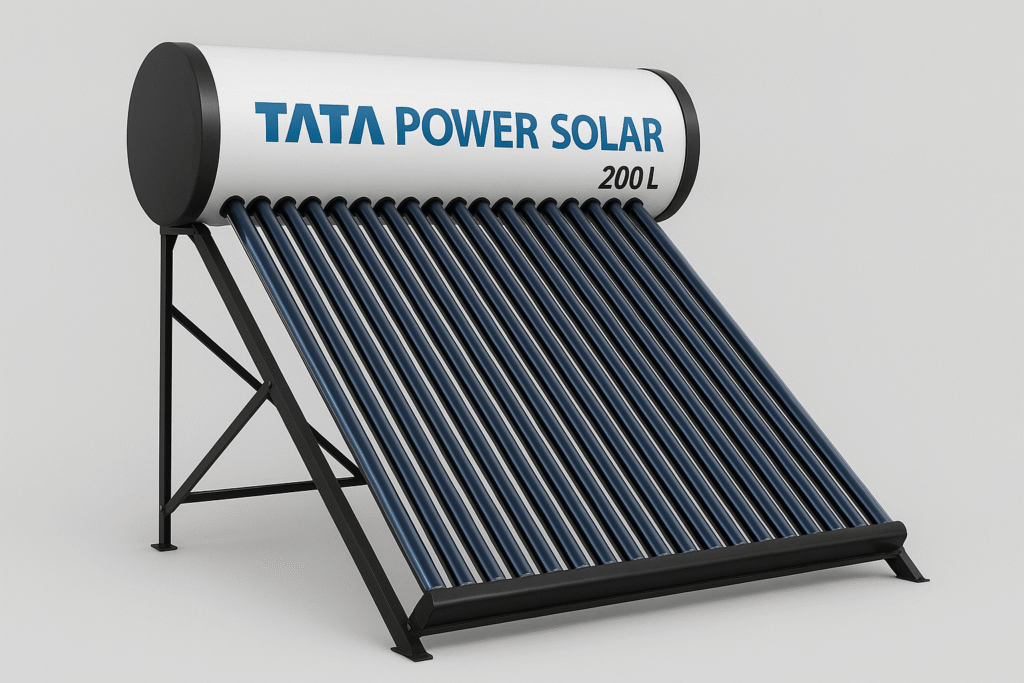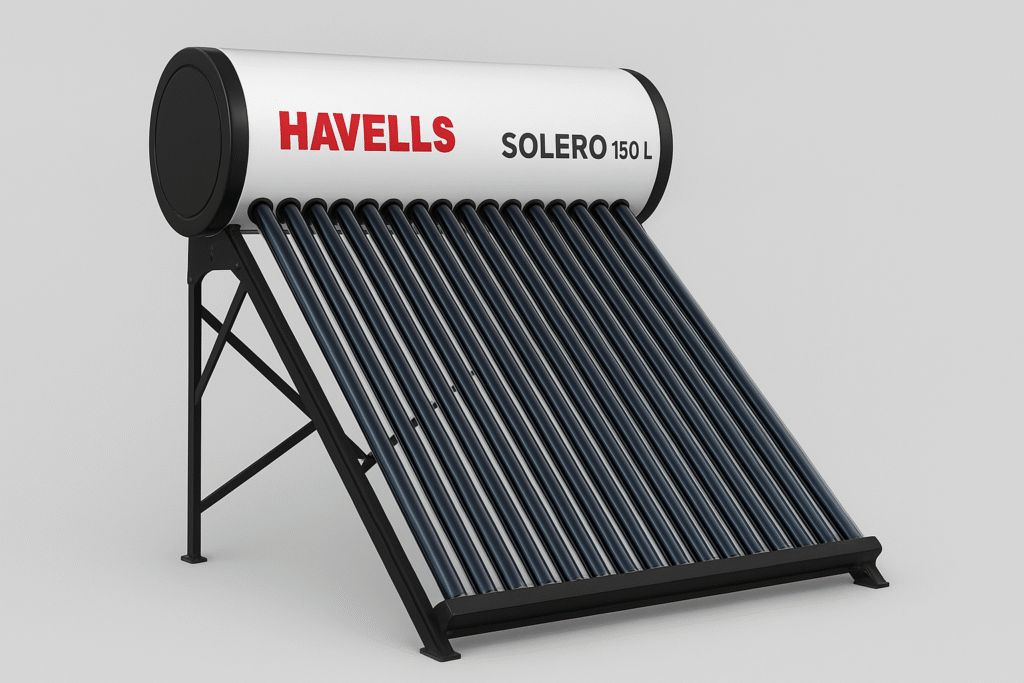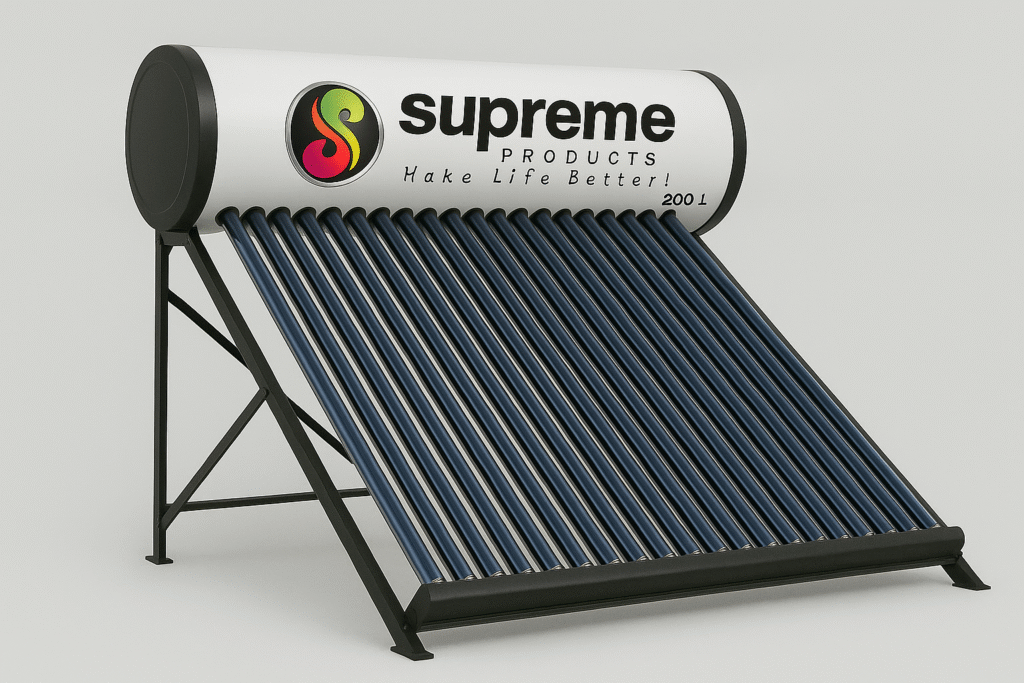Table of Contents
ToggleIntroduction
Are rising electricity and gas bills making even a simple hot shower feel costly? With energy prices going up across India, heating water at home has become an expensive affair. That’s why more and more families are now switching to solar water heaters — a smart and eco-friendly alternative.
By 2025, solar water heating systems are becoming a popular choice in Indian homes. They help you save money, reduce your dependence on electricity, and work well in most weather conditions. Picking the best solar water heater in India 2025 not only lowers your monthly expenses but also supports a greener and cleaner environment.
In this guide, we’ll walk you through everything you need to know — how solar water heaters work, their key benefits, the difference between ETC and FPC types, what to look for before buying, details on government subsidies, and a handpicked list of the top models with prices and reviews.
What is a Solar Water Heater?
A solar water heater is a system that uses sunlight to heat water for daily needs. Instead of relying on electricity or LPG gas, it runs on solar energy, making it both cost-effective and eco-friendly. In 2025, these systems are becoming very popular in India because they can provide hot water for bathing, washing, and even small businesses — all at almost zero running cost.
How Does a Solar Water Heater Work?
The working principle is simple:
Sunlight falls on solar collectors (either tubes or panels).
These collectors absorb heat and transfer it to the water.
The hot water is then stored in an insulated tank for use throughout the day.
Except for some models that use a small pump, the process requires no electricity and can even heat water on slightly cloudy days.
Types of Solar Water Heaters (ETC vs FPC)
1. ETC (Evacuated Tube Collector):
Uses glass tubes to absorb sunlight.
Works well in colder regions and is generally cheaper.
Pros: Affordable, good performance in winter.
Cons: Glass tubes are fragile and need careful handling.
2. FPC (Flat Plate Collector):
Uses flat metal plates with copper or aluminium absorbers.
Known for being durable and long-lasting.
Pros: Strong build, long life (15–20 years).
Cons: Slightly more expensive than ETC.
👉 In 2025, ETC heaters are popular for budget-friendly homes, while FPC is preferred by premium users for its durability.
Solar Water Heater vs Electric/Gas Geyser
| Feature | Solar Water Heater | Electric/Gas Geyser |
|---|---|---|
| Running Cost | Almost zero | High (₹800–1500/month) |
| Eco-friendly | ✅ Yes | ❌ No |
| Lifespan | 15–20 years | 5–7 years |
| Initial Cost | Higher (₹15k–₹60k) | Lower (₹5k–₹15k) |
| Govt Subsidy Available | ✅ Yes | ❌ No |
👉 Clearly, choosing the best solar water heater in India 2025 is a smarter long-term investment compared to using electric or gas geysers.
Benefits of Choosing the Best Solar Water Heater in India 2025
Solar water heaters come with many advantages — let’s look at them in simple points:
1. Huge Cost Savings
Switching to solar water heating can reduce your electricity or LPG bills by 50–70%.
Once you invest in the system, the cost of heating water is almost zero, which means big savings in the long run.
2. Eco-Friendly & Clean Energy
Solar water heaters run on renewable energy and don’t cause any pollution.
When more households adopt solar, it helps reduce the overall carbon footprint and supports a cleaner environment.
3. Government Subsidies & Support
In 2025, both the Central and State governments are offering subsidies for solar water heaters.
This financial support lowers the upfront cost, making solar systems more affordable for everyone.
4. Long-Term Durability
Solar water heaters are built to last 15–20 years with minimal maintenance.
Apart from small routine checks, they require very little upkeep, making them a reliable long-term investment.
Buying Guide – Factors to Consider Before Choosing a Solar Water Heater
Before buying a solar water heater, it’s important to understand a few key factors. These will help you pick the right model for your home and family needs.
1. Capacity (Litres)
The storage capacity of the tank should match your family size:
2–3 members: 100–150 litres
4–5 members: 200–250 litres
6+ members: 300–500 litres
2. Type (ETC vs FPC)
ETC (Evacuated Tube Collector): Affordable, easy to maintain, and performs well in colder regions.
FPC (Flat Plate Collector): Slightly expensive but more durable, and works better in coastal or harsh weather conditions.
3. Tank Material
Stainless steel tanks are the best choice since they are rust-free and have a longer life.
Glass-lined or enamel-coated tanks are also good alternatives for durability.
4. Warranty
Always look for a solar water heater with at least 5 years of warranty.
Premium brands even offer 7–10 years of coverage, giving you extra peace of mind.
5. Price Range
Budget models: ₹15,000–20,000
Mid-range: ₹20,000–40,000
Premium models: ₹40,000+ (offer better efficiency and longer lifespan)
Best Solar Water Heaters in India 2025 – Top Picks
The market is full of solar water heater models. But to save your time, we’ve shortlisted some of the best solar water heaters in India 2025 based on price, performance, and durability.
Features:
ETC technology with triple-layered glass tubes
Stainless steel inner tank
200 litres capacity (ideal for a family of 4–5)
Pros: Durable, excellent brand service
Cons: Slightly on the expensive side
Approx Price: ₹28,000–32,000
Features:
FPC (Flat Plate Collector) technology
Blue enamel-coated tank for durability
Performs well in coastal regions
Pros: Energy-efficient, comes with a 5-year warranty
Cons: Installation can feel a bit heavy
Approx Price: ₹25,000–30,000
Features:
ETC model with high-efficiency tubes
Specially designed for Indian weather conditions
200 litres capacity
Pros: Reliable brand, strong build quality
Cons: Installation charges may be extra
Approx Price: ₹27,000–35,000
Features:
ETC technology
Rust-proof tank with compact design
150 litres capacity
Pros: Compact size, good warranty
Cons: Not suitable for large families
Approx Price: ₹20,000–25,000
Features:
ETC-based system
Stainless steel inner tank
Long lifespan with minimal maintenance
Pros: Affordable and durable
Cons: Availability can be limited in some cities
Approx Price: ₹22,000–26,000
Price Range of Solar Water Heaters in India
Solar water heaters in India are available in different price ranges depending on the capacity, brand, and technology. Here’s a quick breakdown to help you choose the right option as per your budget and family needs.
Budget-Friendly Options (₹10,000 – ₹20,000)
These models are ideal for small families (2–3 members).
In this price range, you’ll mostly find basic ETC (Evacuated Tube Collector) solar water heaters with a capacity of 100–150 litres.
👉 Affordable and practical for daily household use.
Mid-Range Options (₹20,000 – ₹40,000)
Perfect for medium-sized families (4–6 members).
Here, you’ll get solar water heaters with 150–250 litres capacity, better build quality, and products from trusted brands.
👉 A great choice if you want both performance and efficiency without overspending.
Premium Options (₹40,000 & Above)
These are designed for large families or small commercial setups.
They often come with FPC (Flat Plate Collector) technology, bigger tanks (300–500 litres), and advanced insulation for higher efficiency.
👉 Though slightly expensive, they’re the best long-term investment for durability and maximum energy savings.
Government Subsidies & Schemes (2025 Update)
Both the Central and State governments in India offer subsidies for adopting solar water heaters. This reduces the initial cost and encourages more people to switch to this green technology.
Central Govt Schemes
The MNRE (Ministry of New and Renewable Energy) announces subsidies on solar products every year.
Usually, you can get up to 30% subsidy on solar water heaters (always check the latest updates for 2025).
The subsidy is provided through approved vendors and state nodal agencies.
In many places, banks also offer easy loans with low interest for installing solar water heaters.
State-Level Subsidies
Many states in India provide extra benefits:
States like Maharashtra, Gujarat, Karnataka, and Tamil Nadu may offer additional subsidies or electricity bill rebates.
Some states even provide property tax exemptions for households installing solar water heaters.
State Energy Development Agencies (SEDA) release notifications about these benefits from time to time.
📌 Pro-tip: To avail subsidies, always get your system installed through an MNRE-approved supplier or installer.
Maintenance & Lifespan of Your Best Solar Water Heater in India 2025
If you’re investing in the best solar water heater in India 2025, taking proper care of it is the key to getting maximum efficiency and long life. With just a little maintenance, these systems can easily serve your family for decades.
Cleaning & Care Tips
Regular Cleaning of Tubes/Panels: Dust, dirt, and bird droppings reduce efficiency. Clean the collectors every 2–3 weeks using plain water and a soft cloth or brush.
Avoid Harsh Chemicals: Never use detergents or abrasive cleaners as they can damage the tubes or panel coating.
Check for Leakages: Keep an eye on joints, valves, and pipes to ensure there are no leaks.
Monitor Water Quality: If your area has hard water, use a softener to prevent scaling inside the tank and tubes.
Tank Maintenance
Insulation Check: Ensure that the tank insulation is intact so water remains hot for longer hours.
Anti-Corrosion Measures: Stainless steel or enamel-coated tanks require little care. If your heater has a magnesium rod (sacrificial anode), replace it every 2–3 years to prevent rust.
Annual Inspection: Get your solar water heater checked by an authorized service provider at least once a year for preventive maintenance.
Average Lifespan (15–20 Years)
A good quality system can last 15–20 years if maintained properly.
ETC (Evacuated Tube Collectors): Usually last 12–15 years with careful use.
FPC (Flat Plate Collectors): More durable and can easily run for 15–20 years.
The storage tank may need replacement after 10–12 years, depending on water quality and usage.
👉 With the right care, the best solar water heater in India 2025 not only gives you reliable hot water but also ensures long-term savings and eco-friendly performance for years to come.
Frequently Asked Questions (FAQs)
Q1. What is the average price of a best solar water heater in India in 2025?
The average price ranges from ₹18,000 to ₹55,000, depending on the capacity, type (ETC or FPC), and brand.
Q2. Which is better for Indian households – ETC or FPC solar water heater?
ETC (Evacuated Tube Collector) heaters are more affordable and work well in most climates.
FPC (Flat Plate Collector) heaters are more durable and ideal for areas with hard water or coastal regions.
Q3. How much money can I save by using a solar water heater instead of an electric geyser?
A solar water heater can save around ₹8,000–₹12,000 per year on electricity bills for a family of 4, making it a smart investment.
Q4. Do solar water heaters work during winter and rainy seasons?
Yes, they do, although efficiency may drop slightly. Most models come with an electric backup to ensure hot water even on cloudy or rainy days.
Q5. What is the lifespan of a best solar water heater in India 2025?
With proper maintenance and annual cleaning, a good quality solar water heater lasts 15–20 years.
Q6. Are there government subsidies available for solar water heaters in 2025?
Yes! Both the Indian government and some states offer subsidies of up to 30–40% under renewable energy schemes, making it more affordable to install a solar water heater in 2025.
Q7. Which is the best solar water heater brand in India in 2025?
Top-rated brands include V-Guard, Havells, Racold, Supreme Solar, and Tata Power Solar. Choosing the best solar water heater in India 2025 depends on your capacity needs, budget, and durability preference.
Q8. How do I choose the right capacity for my family?
2–3 members: 100L system is sufficient
4–5 members: 200L system
Large families: 300L or more
Q9. Can a solar water heater work with hard water?
Yes, but FPC systems handle hard water better. ETC models may require a water softener for long-term performance.
Q 10. Is installing a solar water heater worth it in 2025?
Absolutely! With rising electricity costs, eco-friendly benefits, and government subsidies, investing in a best solar water heater in India 2025 is one of the smartest choices for any household.
Conclusion
Investing in the best solar water heater in India 2025 is not just a smart choice for your home, but also a step towards a greener and more sustainable lifestyle. By switching to solar water heating, you can cut down electricity bills, reduce dependency on fossil fuels, and enjoy hot water throughout the year with minimal running costs.
If you’re considering a solar setup for your home, don’t forget to maintain your system regularly for long-lasting performance. You can also check our guide on Solar Panel Ki Dekhbhal Kaise Kare to learn simple maintenance tips for all solar products.
For those interested in expanding your green energy solutions, explore Best Solar Garden Lights in India to make your outdoor spaces eco-friendly and cost-efficient. And if you are curious about the overall costs of installing solar systems, our detailed post on Solar Panel Installation Cost in India will help you plan your budget effectively.
With government subsidies and easy financing options available in 2025, installing a solar water heater is easier and more affordable than ever. Make sure to choose an MNRE-approved system from a trusted brand like V-Guard, Havells, Racold, or Tata Power Solar for maximum efficiency and reliability.
✅ Start your solar journey today, and enjoy eco-friendly, cost-saving hot water while contributing to a cleaner planet.
{ "@context": "https://schema.org", "@type": "FAQPage", "mainEntity": [ { "@type": "Question", "name": "What is the average cost of a solar water heater in India in 2025?", "acceptedAnswer": { "@type": "Answer", "text": "In 2025, the price of a solar water heater in India generally ranges from ₹18,000 to ₹55,000, depending on the capacity, type (ETC or FPC), and brand." } }, { "@type": "Question", "name": "Which is better for Indian homes – ETC or FPC solar water heater?", "acceptedAnswer": { "@type": "Answer", "text": "ETC (Evacuated Tube Collector) heaters are budget-friendly and perform well in most climates, while FPC (Flat Plate Collector) heaters are more durable and ideal for areas with hard water or coastal regions." } }, { "@type": "Question", "name": "How much can I save by using a solar water heater instead of an electric geyser?", "acceptedAnswer": { "@type": "Answer", "text": "A solar water heater can help a family of 4 save around ₹8,000–₹12,000 per year on electricity bills." } }, { "@type": "Question", "name": "Do solar water heaters work in winter and rainy seasons?", "acceptedAnswer": { "@type": "Answer", "text": "Yes, solar water heaters work in all seasons, including winter and rainy days. However, efficiency may reduce, so most systems come with an electric backup for cloudy weather." } }, { "@type": "Question", "name": "What is the lifespan of a solar water heater in India?", "acceptedAnswer": { "@type": "Answer", "text": "A high-quality solar water heater lasts around 15–20 years if maintained properly with regular cleaning and servicing." } }, { "@type": "Question", "name": "Are government subsidies available on solar water heaters in 2025?", "acceptedAnswer": { "@type": "Answer", "text": "Yes, both the Indian government and some state governments are offering subsidies of up to 30–40% under renewable energy schemes in 2025." } }, { "@type": "Question", "name": "Which is the best solar water heater brand in India in 2025?", "acceptedAnswer": { "@type": "Answer", "text": "Popular and trusted brands in 2025 include V-Guard, Havells, Racold, Supreme Solar, and Tata Power Solar." } }, { "@type": "Question", "name": "How do I select the right capacity of solar water heater for my family?", "acceptedAnswer": { "@type": "Answer", "text": "For 2–3 members, a 100L system is enough. For 4–5 members, choose 200L. Larger families may need 300L or more." } }, { "@type": "Question", "name": "Can solar water heaters work with hard water?", "acceptedAnswer": { "@type": "Answer", "text": "Yes, but FPC models are more suitable for hard water. ETC models can also be used, but may need a water softener for better long-term performance." } }, { "@type": "Question", "name": "Is it worth installing a solar water heater in 2025?", "acceptedAnswer": { "@type": "Answer", "text": "Absolutely! With rising electricity costs, eco-friendly benefits, and government subsidies, investing in a solar water heater in 2025 is one of the smartest choices for Indian households." } } ] }


